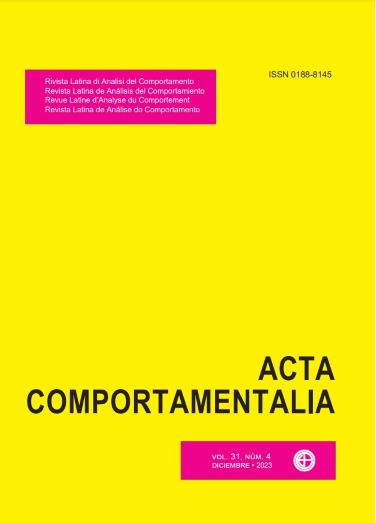Control by units smaller than the word in a reading and writing teaching program
DOI:
https://doi.org/10.32870/ac.v31i4.87204Keywords:
Reading and writing instruction, recombination, recreational activities, partial stimulus control, childrenAbstract
The Small Steps Reading and Writing Instruction (ALEPP) is based on stimulus equivalence paradigm and has been used as a complementary procedure to literate children with learning disabilities. This study aimed to identify and describe the development of control by units smaller than the word in the reading and writing of four children (6-7 years old) with learning disability. Children participated in a community action project that applied the ALEPP, complemented with dictation taking and playing activities. The teaching program stablished relations between dictated words/syllables and the corresponding printed words/syllables, matching with constructed response and dictation taking. Recreational activities were used as retention tasks with trained syllables and words. Stimulus control of reading and writing was analyzed for: total answer; bigrams; vowels; consonants; first and last half of the word. Total and partial successes were analyzed before, in the middle and at the end of the study. Three participants who already had some partial control that allowed correct responses of a few whole words before the training, obtained precise performances from the middle of the program in oral reading and dictation with trained and recombination words. The participant with no correct responses in reading and writing of whole words and only partial control for a few vowels and consonants, showed higher scores in the training words halfway through the program, with partial control by the vowel and word end, showing precise performances and recombination at the end of the program. The results showed individual differences in stimulus controls of words and their elements for reading and writing before at the beginning of the study and throughout the learning process. The rapid change in control by word elements suggests that syllable discrimination and dictation training, combined with playful retention activities, may have accelerated the development of recombinative reading and writing.
Downloads
Downloads
Published
How to Cite
Issue
Section
License

<a rel="license" href="http://creativecommons.org/licenses/by-nc-sa/4.0/"><img alt="Licencia de Creative Commons" style="border-width:0" src="https://i.creativecommons.org/l/by-nc-sa/4.0/88x31.png" /></a><br />Este obra está bajo una <a rel="license" href="http://creativecommons.org/licenses/by-nc-sa/4.0/">licencia de Creative Commons Reconocimiento-NoComercial-CompartirIgual 4.0 Internacional</a>.






